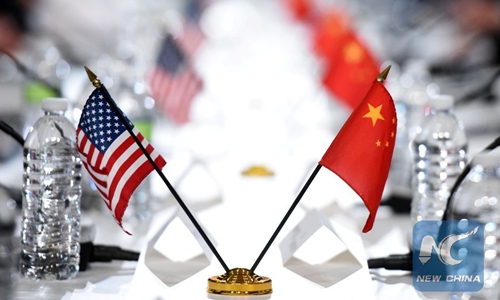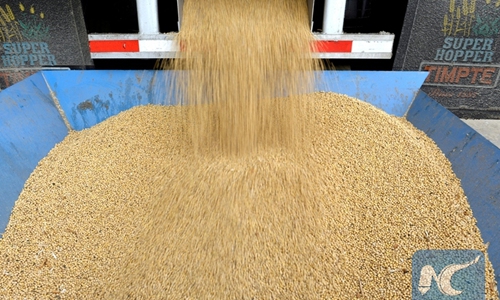China-US phase-1 deal may not be carried out 100%, but won’t return to square one: expert
By Wang Cong Source:Global Times Published: 2020/5/6 18:48:40
Pandemic, US attacks pose challenges to implementation: experts

File photo taken on November 23, 2016 shows the national flags of the United States and China during the 27th Session of the China-US Joint Commission on Commerce and Trade in Washington DC, US. Photo: Yin Bogu/Xinhua
Full implementation of the phase one trade agreement between China and the US is highly unlikely, despite China's efforts to carry out its end of the bargain, due to obstacles posed by the coronavirus pandemic, which could undercut the US' ability to supply relevant products, but it won't return to square one, Chinese trade experts close to the government said on Wednesday.
Recent groundless attacks by US officials, including President Donald Trump and Secretary of State Mike Pompeo, on China over the origin of the deadly virus will inevitably add uncertainty to the phase one deal, as China may reconsider its position on bilateral trade relations amid an escalating war of words, the experts noted.
"At the moment, it appears that there are certain difficulties for implementing the [phase one agreement] 100 percent," Huo Jianguo, vice chairman of the China Society for World Trade Organization Studies in Beijing, told the Global Times on Wednesday.
That is not because China lacks the initiative to carry out the deal; rather, it is because of the emergence of the coronavirus pandemic, which has posed serious challenges for both countries as well as global trade, according to Huo, who also advises the Chinese government on trade issues.
"We should create conditions to continue implementation but if it can't be executed, then we should maintain communication with the US in line with the specific situation," he said, adding that the two parties must be clear on their responsibilities, such as which side is at fault or whether it's a logistics issue, to avoid disagreements.
The phase one trade pact contains a force majeure clause, whereby the two parties should start consultations in the event of a natural disaster or "other unforeseeable events outside the control of" of the two parties.
But Chinese officials stressed as recently as last month that China has been carrying out the phase one deal, despite the COVID-19 pandemic. China has announced several rounds of tariff exemptions for US products, including agricultural goods - an important part of China's commitment under the phase one deal to increase purchases of US products by $200 billion over the next two years.
China's efforts translated into a 110-percent year-on-year increase in imports of US agricultural products in the first quarter, which reached 33.56 billion yuan ($4.73 billion), including 21.88 billion yuan in soybeans, up 210 percent.
In another sign of China's efforts to carry out the deal, Zhang Xiaoping, country director for China at the US Soybean Export Council, said that although China usually buys soybeans from Brazil and other South American suppliers starting each March, Chinese companies bought more than 1.1 million tons of US soybeans between mid-March and late April.
"That is thought-provoking. First, only one or two state-owned companies are buying US soybeans; two, the price is not cheaper than [soybeans from] South America," Zhang told the Global Times on Wednesday.

Photo:Xinhua
But he noted that the number was only half of the year-earlier level, when soybean purchases were boosted by a trade truce reached during a leaders' summit in Argentina.
Overall, Chinese imports of US products may not have risen in April because of the COVID-19 pandemic in the US, according to Song Guoyou, deputy director of the Center for American Studies under Fudan University.
"There might not be a big improvement although China has emerged from the epidemic, the latest situation in the US remains severe," Song, who advises the Chinese government on trade, told the Global Times on Wednesday, adding that US economic activity has essentially stopped.
China is scheduled to release trade data for April on Thursday.
Apart from the pandemic, US officials' escalating attacks on China and even threats of more tariffs on China could add new uncertainty to the implementation of the phase one deal, let alone starting phase two talks, experts said.
The attacks and threats of punishment pose a serious question for China, where "if we chose to fight firmly, then we should not try seriously to complete soybean imports [from the US]… because even if you fulfill that commitment, [the US] will take its undeserved gain for granted, and even exert pressure on us," Huo said.
Following Trump's threat of new tariffs on China, the White House has since clarified that the US would not punish China economically if Beijing fulfills its commitments under the phase one deal, the Wall Street Journal reported on Monday.
The US Trade Representative's office was reportedly considering a one-year extension of tariff exemptions for some Chinese products.
Song said that both sides still want to implement the phase one deal despite the COVID-19 challenge, but "if the Trump administration uses additional tariffs as a way to 'punish' China, China will also consider proportionate countermeasures."
Posted in: ECONOMY